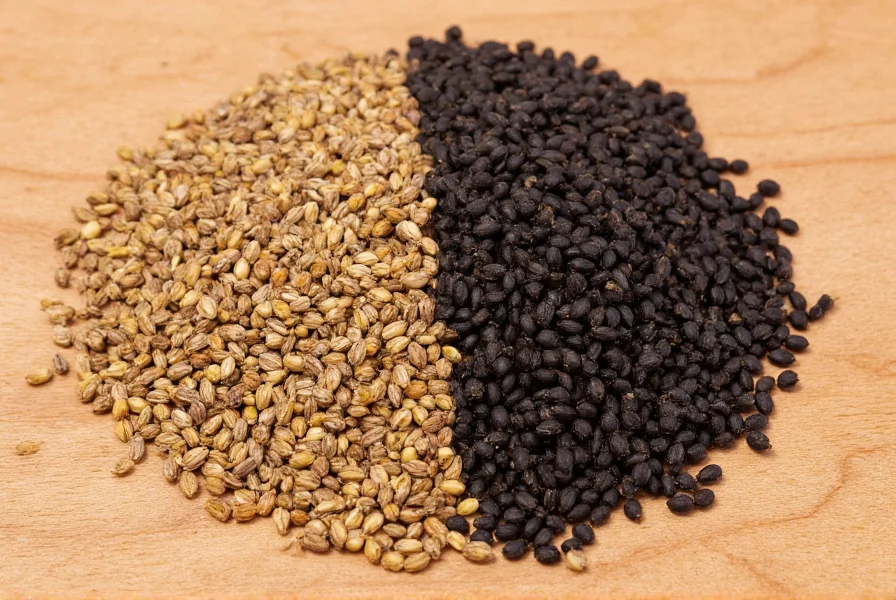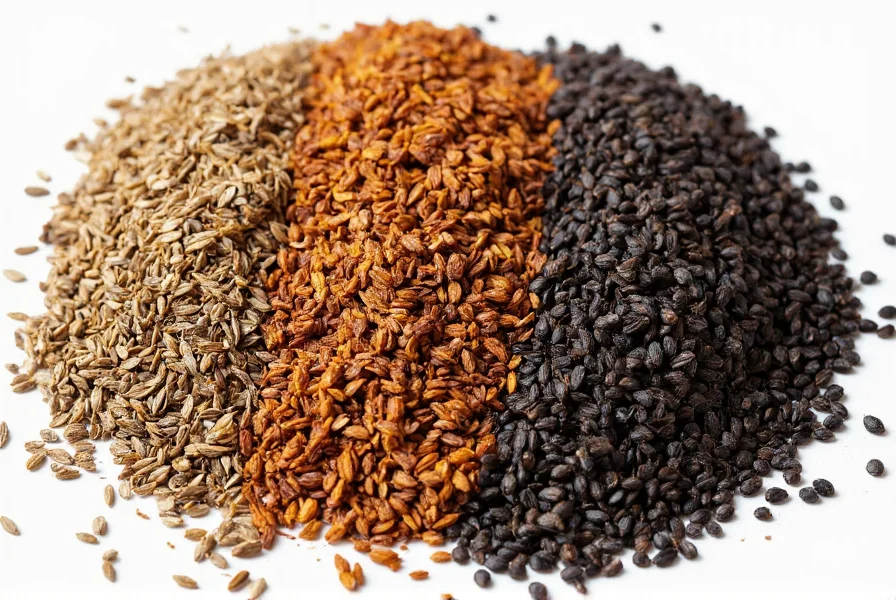When exploring cumin and black seed, it's essential to understand these two powerful spices aren't interchangeable despite occasional confusion in naming. Both have been used for centuries across Middle Eastern, Indian, and Mediterranean cuisines and traditional medicine systems, but their botanical origins, chemical compositions, and applications differ substantially.
Understanding Cumin and Black Seed: Not the Same Spice
One of the most common misconceptions is that black seed is a variety of cumin. This confusion often arises because black seed is sometimes marketed as "black cumin"—a misnomer that creates unnecessary ambiguity. True cumin (Cuminum cyminum) belongs to the Apiaceae family, while black seed (Nigella sativa) comes from the Ranunculaceae family. They're botanically unrelated, with distinct appearances, flavors, and chemical properties.
| Characteristic | Cumin | Black Seed (Nigella sativa) |
|---|---|---|
| Botanical Name | Cuminum cyminum | Nigella sativa |
| Appearance | Light to dark brown, oblong seeds | Small, matte black triangular seeds |
| Flavor Profile | Earthy, warm, slightly bitter, with citrus notes | Peppery, slightly bitter, with oregano-like notes |
| Primary Active Compounds | Cuminaldehyde, flavonoids | Thymoquinone, nigellone |
| Common Culinary Uses | Curries, chili, spice blends, roasted vegetables | Breads, pickles, Middle Eastern dishes, topping for naan |
Nutritional Comparison of Cumin and Black Seed
Both spices offer impressive nutritional profiles, though their specific benefits differ. A single tablespoon (6g) of cumin contains approximately:
- 29 calories
- 2.3g protein
- 2.3g fiber
- 10% of daily iron needs
- Significant manganese and calcium
Black seed, in the same serving size (2g), provides:
- 11 calories
- 0.6g protein
- 0.6g fiber
- Small amounts of iron, calcium, and magnesium
- Essential fatty acids including linoleic acid
When examining the nutritional comparison of cumin and black seed, cumin generally offers more substantial mineral content per serving, while black seed's primary value comes from its unique phytochemicals rather than macronutrients.
Health Benefits: Scientific Evidence Behind Each Spice
Research on cumin and black seed health benefits reveals different therapeutic potentials:
Cumin Benefits:
- Digestive health: Multiple studies show cumin extract improves symptoms of irritable bowel syndrome and enhances digestive enzyme production
- Blood sugar control: Research published in Complementary Therapies in Medicine found cumin supplementation significantly reduced fasting blood glucose in type 2 diabetes patients
- Antioxidant properties: Cumin contains potent antioxidants that combat oxidative stress, with one study showing it outperformed black pepper and coriander in antioxidant capacity
Black Seed Benefits:
- Anti-inflammatory effects: Thymoquinone, black seed's primary active compound, demonstrates significant anti-inflammatory properties in numerous studies
- Respiratory health: Clinical trials suggest black seed oil may improve lung function in asthma patients
- Cardiovascular support: Research indicates black seed may help regulate blood pressure and improve lipid profiles
While both spices show promise, the scientific evidence for black seed's therapeutic applications appears more extensive in current literature, particularly regarding inflammatory conditions.

Culinary Applications: When to Use Each Spice
Understanding the difference between cumin and black seed in cooking is crucial for proper application:
Cumin: Best used in dishes requiring earthy warmth. It's essential in chili, curry powders, taco seasoning, and Middle Eastern spice blends like baharat. For maximum flavor, toast whole cumin seeds in a dry pan before grinding. Cumin pairs well with coriander, turmeric, and chili powder.
Black Seed: Traditionally used as a finishing spice rather than a base flavor. It's commonly sprinkled on breads (like naan and馕), added to pickles, or used in Middle Eastern cheese dishes. Black seed has a more delicate flavor that can be overwhelmed if used too early in cooking. Many chefs recommend using it raw or added near the end of preparation.
Can you substitute cumin for black seed? Generally not advisable due to their distinct flavor profiles. While both have warm, earthy notes, cumin's stronger, more dominant flavor would overwhelm dishes specifically designed for black seed's more subtle, peppery taste.
Storage Recommendations for Maximum Freshness
To preserve the volatile oils that give these spices their distinctive flavors and health properties:
- Cumin: Store whole seeds in an airtight container away from light and heat. Ground cumin loses potency quickly—use within 6 months for best flavor. For extended shelf life, refrigerate cumin seeds.
- Black Seed: Keep in a cool, dark place in a sealed container. Black seed oil should be refrigerated after opening and used within 3-6 months. Exposure to light and air significantly reduces thymoquinone content.
Proper storage ensures you get the maximum cumin vs black seed health benefits from your spices.
Safety Considerations and Potential Interactions
Both spices are generally recognized as safe when consumed in culinary amounts. However, when considering therapeutic doses:
- Cumin: May interact with diabetes medications (potentially enhancing blood sugar lowering effects) and anticoagulants. Pregnant women should avoid medicinal amounts.
- Black Seed: May lower blood sugar and blood pressure, requiring monitoring if taking related medications. Some individuals report mild gastrointestinal discomfort at high doses.
Always consult with a healthcare provider before using either spice medicinally, especially if you have underlying health conditions or take prescription medications.

Conclusion: Choosing Between Cumin and Black Seed
While often confused, cumin and black seed serve different purposes in both the kitchen and potential health applications. Cumin offers robust flavor and digestive benefits, making it indispensable in many global cuisines. Black seed provides unique phytochemicals with promising research for inflammatory conditions. Understanding the difference between cumin and black seed allows you to use each appropriately for both culinary excellence and potential health support.
Can I substitute cumin for black seed in recipes?
No, cumin and black seed have distinct flavor profiles and aren't suitable substitutes. Cumin has a stronger, earthier taste while black seed offers more subtle peppery notes. Using one in place of the other will significantly alter your dish's flavor profile.
Which spice has more scientific evidence for health benefits?
Both have promising research, but black seed (Nigella sativa) currently has more extensive clinical studies, particularly regarding its anti-inflammatory properties and thymoquinone content. Cumin shows strong evidence for digestive health and blood sugar regulation.
Is black seed the same as black cumin?
No, this is a common misconception. Black seed (Nigella sativa) is sometimes incorrectly called "black cumin," but it's botanically unrelated to true cumin (Cuminum cyminum). They come from different plant families and have distinct properties.
How should I store cumin and black seed for maximum freshness?
Store both in airtight containers away from light and heat. Whole cumin seeds last 1-2 years, while ground cumin should be used within 6 months. Black seed maintains potency for 1-2 years when stored properly. Black seed oil should be refrigerated after opening and used within 3-6 months.
Are there any safety concerns with consuming cumin or black seed?
Both are safe in culinary amounts. However, medicinal doses may interact with diabetes medications (both spices), blood pressure medications (black seed), and blood thinners (cumin). Pregnant women should avoid medicinal amounts of cumin. Consult your healthcare provider before using either therapeutically.











 浙公网安备
33010002000092号
浙公网安备
33010002000092号 浙B2-20120091-4
浙B2-20120091-4